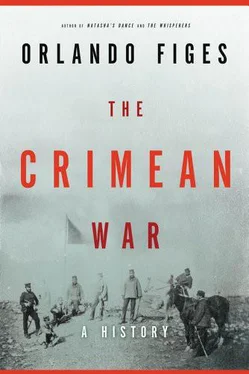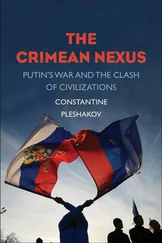The Sultan appealed to the British and the French, but neither showed much interest in helping him, so he turned in desperation to the Tsar, who promptly sent a fleet of seven ships with 40,000 men to defend the Turkish capital against the Egyptians. The Russians considered Mehmet Ali a French lackey who posed a significant danger to Russian interests in the Near East. Since 1830 the French had been engaged in the conquest of Ottoman Algeria. They had the only army in the region capable of checking Russian ambitions. The Russians, moreover, had been disturbed by reports from their agents that Mehmet Ali had promised to ‘resurrect the former greatness of the Muslim people’ and take revenge on Russia for the humiliation suffered by the Turks in 1828–9. They were afraid that the Egyptian leader would stop at nothing less than ‘the conquest of the whole of Asia Minor’ and the establishment of a new Islamic empire supplanting the Ottomans. Instead of a weak neighbour, the Russians would be faced by a powerful Islamic threat on their southern border with strong religious connections to the Muslim tribes of the Caucasus. 25
Alarmed by the Russian intervention, the British and French moved their fleets to Besika Bay, just beyond the Dardanelles, and in May 1833 brokered an agreement known as the Convention of Kütahya between Mehmet Ali and the Turks by which the Egyptian leader agreed to withdraw his forces from Anatolia in exchange for the territories of Crete and the Hijaz (in western Arabia). Ibrahim was appointed lifetime governor of Syria but Mehmet Ali was denied his main demand of a hereditary kingdom for himself in Egypt, leaving him frustrated and eager to renew his war against the Turks should another chance present itself. The British strengthened their Levant fleet and put it on alert to serve the Sultan if Mehmet Ali threatened him again. Their arrival on the scene was enough to force the Russians to withdraw, but only after they had, in recognition of Russia’s role in rescuing the Ottoman Empire, managed to extract from the Sultan major new concessions through the Treaty of Unkiar-Skelessi, signed in July 1833. The treaty basically reaffirmed the Russian gains of 1829, but it contained a secret article guaranteeing Russia’s military protection of Turkey in exchange for a Turkish promise to close the Straits to foreign warships when demanded by Russia. The effect of the secret clause was to keep out the British navy and put the Russians in control of the Black Sea; but more importantly, as far as the Russians were concerned, it gave them an exclusive legal right to intervene in Ottoman affairs. 26
The British and the French soon found out about the secret clause after it was leaked by Turkish officials. There was outrage in the Western press, which immediately suspected that the Russians had obtained not just the right to close the Straits to other powers but also the right to keep them open to their own warships – in which case they would be able to land a major force in the Bosporus and seize Constantinople in a lightning strike before any Western fleet would have time to intervene (the Black Sea Fleet at Sevastopol was only four days’ sailing from the Turkish capital). In fact, the secret clause had left this point unclear. The Russians claimed that all they had wanted from the controversial clause was a means of self-defence against the possibility of an attack by France or Britain, the major naval powers in the Mediterranean, whose fleets could otherwise sail through the Straits and destroy the Russian bases at Sevastopol and Odessa before their entry into the Black Sea was discovered in St Petersburg. The Straits were ‘the keys to Russia’s house’. If they were unable to close them, the Russians would be vulnerable to an attack on their weakest frontier – the Black Sea littoral and the Caucasus – as indeed they were when Turkey and the Western powers attacked during the Crimean War.
Such arguments were discounted in the West, where Russia’s good intentions were increasingly mistrusted by informed opinion. Now, almost every Russian action on the Continent was interpreted as constituting part of a reactionary and aggressive plan of imperial expansion. ‘No reasonable doubt can be entertained that the Russian Government is intently engaged in the prosecution of those schemes of aggrandizement towards the South which, ever since the reign of Catherine, have formed a prominent feature of Russian policy,’ Palmerston wrote to Lord John Ponsonby in December 1833.
The cabinet of St Petersburg, whenever its foreign policy is adverted to, deals largely in the most unqualified declarations of disinterestedness; and protests that, satisfied with the extensive limits of the empire, it desires no increase of territory, and has renounced all those plans of aggrandizement which were imputed to Russia…
But notwithstanding these declarations, it has been observed that the encroachments of Russia have continued to advance on all sides with a steady march and a well-directed aim, and that almost every transaction of much importance, in which of late years Russia has been engaged, has in some way or other been made conducive to an alteration either of her influence or of her territory.
The recent events in the Levant have, indeed, by an unfortunate combination of circumstances, enabled her to make an enormous stride towards the accomplishment of her designs upon Turkey, and it becomes an object of great importance for the interests of Great Britain, to consider how Russia can be prevented from pushing her advantage further, and to see whether it be possible to deprive her of the advantage she has already gained.
The French statesman François Guizot maintained that the 1833 treaty had converted the Black Sea into a ‘Russian lake’ guarded by Turkey, the Tsar’s ‘vassal state’, ‘without anything hindering Russia herself from passing through the Straits and hurling her ships and soldiers into the Mediterranean’. The chargé d’affaires in St Petersburg lodged a protest with the Russian government warning that if the treaty led to Russia intervening in ‘the internal affairs of the Ottoman Empire, the French government would hold itself wholly at liberty to adopt such a line of conduct as circumstances might suggest’. Palmerston empowered Ponsonby to summon the British fleet from the Mediterranean for the defence of Constantinople, if he felt that it was threatened by Russia. 27
The events of 1833 were a turning point in British policy towards Russia and Turkey. Until then, Britain’s main concern in the Ottoman Empire had been to preserve the status quo, mainly from fears that its breakup would affect the balance of power in Europe and possibly lead to a European war, rather than from any firm commitment to the sovereignty of the Sultan (their support for Greece had not demonstrated much of that). But once the British woke up to the danger that the Ottoman Empire might be taken over by the Egyptians at the head of a powerful Muslim revival, or, even worse, that it might become a Russian protectorate, they took an active interest in Turkey. They increasingly intervened in Ottoman affairs, encouraging economic and political reforms by which the British hoped to restore the health of the Ottoman Empire and expand their influence.
Britain’s interests were mainly commercial. The Ottoman Empire was a growing market for the export of British manufactures and a valuable source of raw materials. As the dominant industrial power in the world, Britain generally threw its weight behind the opening up of global markets to free trade; as the dominant naval power, it was prepared to use its fleet to force foreign governments to open up their markets. This was a type of ‘informal empire’, an ‘imperialism of free trade’, in which Britain’s military power and political influence advanced its commercial hegemony and curtailed the independence of foreign governments without the direct controls of imperial rule.
Читать дальше












